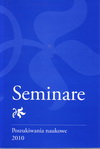Wychowanie do pracy procesem integrującym prawa i obowiązki dziecka przedszkolnego
Education for work as an integration preschool children’s rights and obligations
Author(s): Lidia MarszałekSubject(s): Social Sciences
Published by: Towarzystwo Naukowe Franciszka Salezego (TNFS)
Keywords: Work; education for work; childrens’s rights; preschool child
Summary/Abstract: Work is a fundamental phenomenon for the development of a single person as well as whole societies. It constitutes one of the elementary and, at the same time, the most important aspect of the public existence. It is impossible to separate the process of educating from work, because being one of the most important methods of educating and socializing a child, work is the aim as well as the result of educating. The pre-school period and experience gained at this stage of education influence a child’s future and development in a remarkable way. At that time children, for the first time, face new challenges, fulfill particular roles, do their duties and are happy and satisfied with a job well done. While being accustomed to work a child develops new skills, they learn to appreciate their and others’ work, they learn discipline, and responsibility. A child begins to understand the social sense of work and what it means to them. While participating in various kinds of works, they get to know the reality better, they satisfy curiosity, they broad their knowledge, shape desirable attitude and features of character. It also helps them develop their motor skills and neural system, as well as intensify the sense of social bond, and increase self-confidence. Educational activities, which accustom a child to work during a pre-school period in an interesting, attractive and joyful way, not only introduce a child to the world of a real work but also positively influence the comprehensive child development in all areas of their activity.
Journal: Seminare. Poszukiwania naukowe
- Issue Year: 28/2010
- Issue No: 2
- Page Range: 169-181
- Page Count: 13
- Language: Polish

